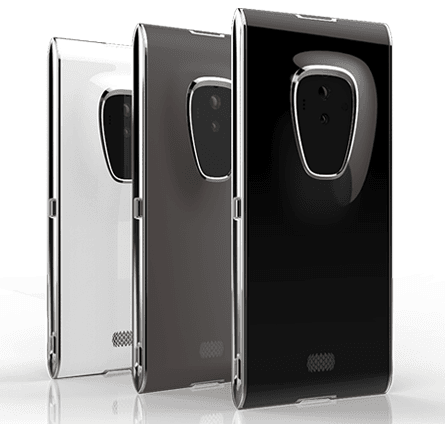Sirin Labs plans to launch a $1,000 cryptocurrency phone in November. Dubbed “Finney,” the phone is named for Bitcoin pioneer Hal Finney. Sirin calls it a “State of the art mobile device” for the “blockchain era.”
Finney: typical phone on the outside, but unique on the inside
On the hardware front, the phone does look similar to other Android phones, but its internal specifications make it different. A glance at the Finney is brings to mind Sirin Labs’ $14,000 Solarin privacy phone, but the little slider on the rear reminds us of an old Nokia slider.
The back of the cryptocurrency smartphone can be pulled out to get a secondary display called the Safe Display, which is designed specifically for crypto transactions. According to Sirin, the Safe Display runs on dedicated software that allows users to track where their crypto is being sent before paying for anything. The slider also opens a cold storage wallet designed to hold a number of different cryptocurrencies.
The Finney is powered by Sirin OS, which is a forked version of Android. The OS is designed to support blockchain apps, crypto wallets, secure exchanges and more. Since the cryptocurrency smartphone offers access to a specific blockchain-related app store and cold storage wallet, it has been made even more secure than the Solarin.
Sirin Labs’ chief marketing officer, Nimrod May, told Cointelegraph that the phone will run on a multi-layer cyber-security suite which will protect users against threats, such as connecting to a rogue network.
The Finney will have a 6-inch screen, 12MP rear camera and 8MP front-facing camera. The cryptocurrency phone will come with a 3,280 mAh battery, fingerprint reader and 6GB of RAM. The phone is powered by a Snapdragon 845 chipset. While all these specifications are similar to those of any top-tier smartphone, Finney’s blockchain abilities set it apart.
According to Sirin Labs, the Finney device will form “an independent blockchain network, a distributed ledger both scalable and lightweight, powered by a fee-less DLC and SIRIN LABS’ security ecosystem.” The Finney will be manufactured by Taiwan-based Foxconn Technology Group. The same company holds significant contracts with the likes of Google, Cisco, Apple, Amazon and Huawei.
Cryptocurrency phone addresses major concerns
May said they were inspired to come with a cryptocurrency phone because they were wondering what is keeping cryptocurrencies from becoming a mass market phenomenon. They identified two main problems, with one obviously being security. Having a secure transaction is a challenge because with blockchain, users have no central organization like a bank to look up to.
Another major shortcoming was the user experience. Even though cryptos are easy to trade, transact and manage, for the average user, they are still somewhat complicated.
“The vision of Sirin Labs right now is to bridge the gap between the blockchain economy and the mass market, by basically addressing and resolving these two inherent problems,” May told ZDNet.
Sirin Labs plans a full ecosystem
May told Cointelegraph that the company aims to set up its own shops worldwide in countries like Japan, the United States and the United Kingdom. Further, Sirin Labs looks forward to launching its own PC-based blockchain technology, which is expected to cost less than the phone.
In November, Sirin also plans to launch a Token Conversion Service (TCS) and DApp store other than the regular Google Play Store. May notes that a TCS will allow users to “go and try and get different coins from different exchanges while using decentralized applications.” The TCS acts as a one-stop shop, allowing transfers and transactions required for purchases using a coin that is not held in a user’s wallet.
Further, phase two of the Finney project is expected to start in 2019 with peer-to-peer blockchain network to link the Finney devices and run the economy based around Sirin’s SRN token. May revealed that Sirin is already in talks with the Cardano team and IOTA team, in addition to other emerging blockchain protocols. Sirin is also working on an SDK to boost the development of DApps that benefit from a fee-less P2P resource-sharing system.
“We need to understand what is the most scalable one, that can make the dream of running a full ecosystem with blockchain and decentralized applications — it might even result in our own blockchain network,” May told ZDNet.
In April, Cointelegraph reported that Sirin Labs was planning to license its technology to other phone manufacturers. Unconfirmed reports later suggested that China’s Huawei is seeking a license for the open-source operating system SIRIN OS to develop its own blockchain smartphone to support DApps.
Apart from Sirin, HTC is also working on a blockchain-powered phone called Exodus, which is expected to hit stores in the third quarter of the year. At the RISE conference in Hong Kong, Phil Chen, chief crypto officer at HTC, said they had already received “tens of thousands” of reservations for the Exodus globally.





